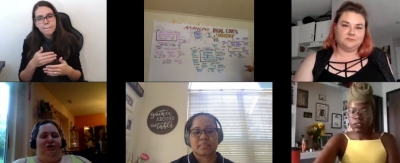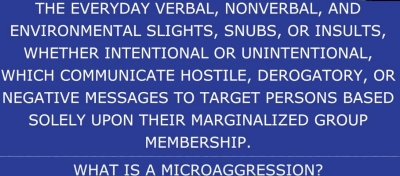Reflections and Resources: Advancing Racial Equity and Inclusion in the Workplace Symposium
The Denver Public Library has prioritized research and learning related to racial equity, diversity and inclusion (EDI), and in 2020 they hosted the Advancing Racial Equity and Inclusion in the Workplace Symposium. This was a dynamic and engaging 3-day online gathering with diverse voices committed to prioritizing how libraries, and other organizations, can look at how they are advancing racial equity and inclusion in the workplace.
In addition to over ten hours of panel presentations, the symposium included self-care sessions at the beginning and end of each day, virtual networking opportunities, and a World Café for individuals to assess and discuss where their organizations are in their workplace racial equity journey. Kudos and congratulations to the planning committee, especially to Ozy Aloziem, Community Connections Program Coordinator at Denver Public Library, for hosting this outstanding event.
WebJunction prioritizes opportunities for library staff to come together in interactive and engaging ways, and this symposium provided numerous opportunities for attendees to share their own questions, experiences and expertise, through chat, at virtual networking tables (using Remo software), and even in an EDI version of Jeopardy! Thank you too, for striving to make the symposium accessible to all, providing a live sign language interpreter for most sessions, and live transcription with Otter.
The symposium sessions were recorded and are now available on the Denver Public Library’s YouTube channel. Library staff and leadership can view the recordings and discuss the content as a group (online or in person), and explore the resources and reflections shared during the symposium. Here are some of those resources, including facets of engagement to consider if you’re planning your own online event.
- The Prework and Reminders page was updated daily, with short introductory videos from presenters, session handouts, and self-care resources. This check-in served as a good way for attendees to prepare for each day.
- In her opening remarks, host Ozy Aloziem shared some of her own story, as well as reflections on Kiese Laymon’s book, Heavy: an American memoir.
- Aloziem also included an acknowledgement of Indigenous land. “We want to acknowledge that we are occupying Indigenous land, we acknowledge that 48 contemporary tribal nations are historically tied to lands that make up the state of Colorado. We acknowledge and honor the Cheyenne, Arapaho and Ute Tribes, and all of the original Indigenous peoples of the land upon which Denver Public Library stands.” Someone shared this fantastic Native Land map during the acknowledgement.
- A multitude of tweets were posted during the symposium using these hashtags: #DPLsymposium and #WorkPlaceRacialEquitySymposium
- Throughout the event, Progressive Stacking was encouraged, inviting BIPOC (Black, Indigenous, People of Color) to add an *asterisk before their question or comment in chat, so their voices could be prioritized. “Progressive stacking is a technique intended to give marginalized voices a chance to speak, particularly in an environment where there is a dominant group. What this means is if you choose to self-identify as belonging to a marginalized racial or ethnic group and you’d like to ask a question or make a comment in chat you can choose to include an asterisk at the start of your question. Our community moderators will be compiling questions during the sessions and will prioritize those with an asterisk.” Learn more about Progressive Stacking.

capturing summary, courtesy Denver Public Library
The World Café debrief near the end of the symposium served as a way for attendees to debrief and discuss next steps, as they return to their organizations with this important work. Attendees were introduced to the World Café model as “a structured conversational process for knowledge sharing in which groups of people discuss a topic at several small tables like those in a café.” This session was an interactive way for individuals to assess and discuss where their organizations are in their workplace racial equity journey. In the debrief session, the three questions explored during the discussions were summarized by each of the table hosts:
Question 1: What is something you are walking away with? Or that moved you?
- Radically rethinking and imagining new systems requires that everyone in the room takes care of themselves.
- This is a journey; it’s going to take time.
- As this work is emotional and heavy for staff, make sure your organization leadership knows that staff need help in prioritizing and actualizing this work.
- We need to challenge our systems to radically rethink how this work is happening.
- Self-care and wellness are most important. (This was mentioned multiple times throughout the symposium.)
- Finding the people that can support this work.
- EDI work is harder and can take more time than we expected.
- With both a professional and personal focus…how do we get our families involved.
Question 2: What is one actionable item you’re committed to? What’s your plan?
- Get involved in the hiring process.
- Change boards and organizations to be more diverse. Improve recruiting efforts.
- Take more breaks…schedule breaks for self-care.
- Learn how to apply the principles.
- Bring experts in if you don’t have internal capacity (outsiders can also help to build internal trust).
- Take the time to go through the resources and digest more deeply.
- Make a point to hear from the community, especially community-led efforts.
- Do mentoring differently and better to empower people to make change.
Question 3: How do you hold yourself accountable?
- Working with others to make change, don’t do it alone. Find accountability partners, allies.
- Focus on specific actions.
- Include EDI goals in your personal performance goals and do an EDI audit to make sure you’re applying what you’re learning.
- Connect with other organizations to help with accountability at an organizational level too. Involve yourself across networks, not just within your organization.
- Make connections with early-career people.
- Create new positions for diverse staff.
- Push your organization for more action, accountability, and a public statement about EDI commitments.
Resources
Many resources were shared by presenters and attendees in chat. Here are a few for you and your team to explore:
- AWAKE to WOKE to WORK: Building a Race Equity Culture (pdf), from Equity in the Center
- We Here, a supportive community for BIPOC library and archive workers
- Challenging the ‘Good Fit’ Narrative: Creating Inclusive Recruitment Practices in Academic Libraries, by Sojourna Cunningham, Samantha Guss, and Jennifer Stout
- Webinar, Disrupting White Supremacy Through BIPOC Solidarity, hosted by the Northern California chapter of the Chinese American Librarians Association, presented by Sofia Leung (also a Symposium presenter in a BIPOC only session, BIPOC Solidarity in Traditionally White Spaces).
- In the session, Equity, Evaluation and Accountability, there was discussion about expanding on SMART goals to make them inclusive and equitable, or SMARTIE. See this SMARTIE goals worksheet (Specific, Measurable, Attainable, Relevant, Time-bound, Inclusive, and Equitable), for example.
- A number of posts from In the Library with the Lead Pipe were shared by presenters and attendees. Read those posts tagged with Diversity.
- A recent WebJunction webinar, Doing the Work Externally and Internally: Race, Equity, Diversity and Inclusion, was mentioned in chat as a good resource to explore hosting circles of dialogue or healing circle discussions.
- When the levees break: the cost of vicarious trauma, microaggressions and emotional labor for Black administrators and faculty engaging in race work at traditionally White institutions, by Myntha Anthym and Franklin Tuitt
- Challenging the ‘Good Fit’ Narrative: Creating Inclusive Recruitment Practices in Academic Libraries, by Sojourna Cunningham, Samantha Guss, and Jennifer Stout
- Taking AIM: Integrating Organization Development into the Creation of a Diversity, Equity, and Inclusion Audit, by Kawanna Bright and Nikhat J. Ghouse
- The Inclusive Services Assessment and Guide for Wisconsin Public Libraries
- Working from Home While Black, by Laura Morgan Roberts and Courtney L. McCluney
- Why People of Color Need Spaces Without White People, by Kelsey Blackwell
- Topographies of Whiteness: Mapping Whiteness in Library and Information Science, edited by Gina Schlesselman-Tarango
- The Characteristics of White Supremacy Culture, from Dismantling Racism: A Workbook for Social Change Groups, by Kenneth Jones and Tema Okun
- Planning a Library Diversity Residency Program: Strategies for Diversity Coordinators to Build Support for their Programs, by Gerald Holmes
- “We Are All for Diversity, but . . .”: How Faculty Hiring Committees Reproduce Whiteness and Practical Suggestions for How They Can Change, by Özlem Sensoy and Robin DiAngelo
- ACRL Diversity Alliance
- The BIPOC Project
The symposium sessions and discussions presented a wealth of resources to help libraries dive deeper into much-needed EDI efforts as a field and within our own organizations. WebJunction is committed to providing more EDI resources and programming for library staff learning, including the webinar, Strengthen Equity, Diversity, and Inclusion Practice Through Self-Paced Learning, about Multnomah County Library's Racially Just Toolkit. Please join us for the webinar, and find more in WebJunction's topic area for Access & Equity, including the See Also list.

